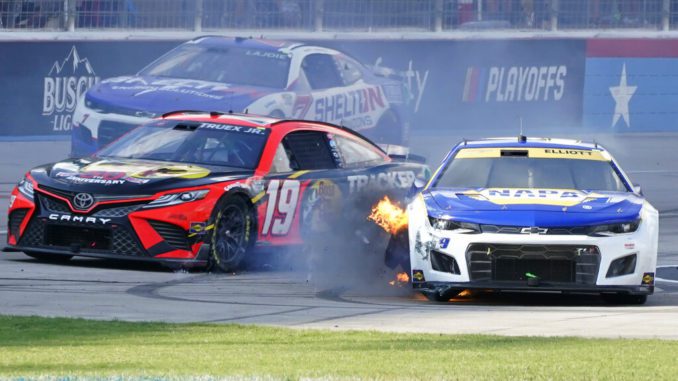
CHARLOTTE— NASCAR’s beleaguered new car somehow made it out of Talladega Superspeedway in the cleanest race yet of this year’s playoffs.
It did little to quell the safety concerns surrounding the Next Gen car that debuted this season. The first four playoff races were a disastrous mess of car fires, broken parts and blown tires, and after Alex Bowman became the second driver sidelined with a concussion, the veterans snapped.
Denny Hamlin, a three-time Daytona 500 winner for Joe Gibbs Racing and co-owner of 23XI Racing with Michael Jordan, led the charge by calling for a complete redesign of the Next Gen and an overhaul of NASCAR leadership. Then Chase Elliott, NASCAR’s most popular driver, spoke up and accused NASCAR of taking a step backward in safety.
“I’m just so disappointed and shocked that we went backwards,” Elliott said.
Then he went out and won an unusually calm race by Talladega standards: of the six cautions, only one was for a multicar crash. The winning crew chief, Alan Gustafson, acknowledged “it was certainly a bit tamer than I expected” and attributed it to the performance of the Next Gen.
Gustafson certainly understood that the midpoint of the playoffs is not the ideal time for an intense debate over driver safety. Bowman and Kurt Busch both suffered concussions when the back of their cars hit the wall; Busch has been out 11 races, while Bowman was diagnosed with his concussion last Thursday — four days after his crash at Texas.
“We know this is an inherently dangerous sport, but I want him to be as safe as he possibly can be,” Gustafson said of Elliott. “I feel like collectively, in this garage, there’s a huge resource of intelligent people where we can push this forward, get to a position where it’s not a topic, not something these guys are having to worry about week in and week out.”
That message was delivered to NASCAR by Rick Hendrick, the most powerful team owner in the sport. He said NASCAR “said they’re working on it” but Hendrick’s sense of urgency increased after Bowman, his own driver, was concussed in what seemed to be a routine hit.
“These guys are stars. You spend a lot of money bringing them along over the years. Then to have ’em hurt, you have sponsors and everything involved, they’re in the playoffs, they get knocked out of the playoffs,” Hendrick said. “And it’s not about the playoffs, it’s about safety, having a guy that wants to be able to race again. We have done really well in the last 10, 15 years with safety in so many ways. But this car, from the rear impact, it’s just like you’re sitting on a piece of steel.
“We need to fix it as soon as we can.”
The Next Gen was an industry collaboration designed to improve the racing, increase parity on the track and reduce costs. The racing for the most part has been better, and 19 different Cup Series winners (including Ryan Blaney’s non-points All-Star victory) is measurable proof the competition has improved.
The car in many areas has been reinforced and is much safer, particularly when drivers are hit in the door or a car lands on its roof. But part of the cost-cutting meant building a very durable car that could withstand crashes and reduce the fleets needed for a 38-race season.
The drivers say they warned NASCAR throughout the development phase the car was too stiff, and many walked away from minor crashes this year complaining it was the hardest hits they’ve ever taken.
Bowman and Busch are the only two drivers to miss races with concussions, but The Associated Press learned of at least two other drivers who believe they suffered concussions earlier this season. A person with direct knowledge of the situation shared the number but was not comfortable sharing further details because the information is private.
NASCAR will be busy this week heading into Sunday’s elimination race at the Roval at Charlotte Motor Speedway. Series leadership has used computer modeling on potential changes for the rear clip, rear bumper structure and center structure, and has a crash test scheduled for Wednesday in Ohio.
NASCAR then has a previously scheduled owners meeting on Friday at 23XI and the drivers have been summoned to a Saturday discussion at the R&D Center. NASCAR President Steve Phelps met privately with Hamlin before Sunday’s race.
The computer modeling and ongoing discussions are taking too long for the drivers’ liking. NASCAR has acknowledged that any improvements wouldn’t be implemented on the cars until 2023; there are five races remaining this season.
“Our drivers are so important, we don’t want ’em hurt, so if it meant buying all new clips Monday morning, I’d do it. I’d be happy to do it,” Hendrick said. “I’m all for whatever it takes. I think the teams could fix it. If NASCAR wants to do it, I think everybody working together, we could do it in a hurry, test it, have it on the cars ASAP.”
It’s not that simple, though, because the Next Gen is a spec car with single-source parts suppliers. The manufacturer would have to make enough new parts for every car and, assuming it can even be done with urgency, smaller teams would have to figure out how to afford unplanned purchases.
Gustafson said setting a timeline for corrections is secondary right now.
“I think the first step is we need a solution, right?” Gustafson said. “That is a good goal for us as an industry to collectively look at what’s the best solution we can come up with in the short term. If we can get the solution figured out, implementation, you can worry about that later.
“I think the solution is the key right now. To my knowledge, it doesn’t exist.”




